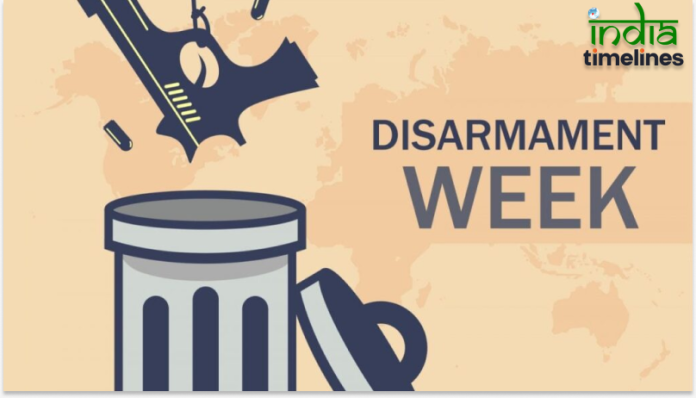
Disarmament Week, celebrated every year from 24th to 30th October, is an international event that highlights the critical importance of disarmament in promoting global peace and security. Initiated by the United Nations, this week-long observance encourages nations and people around the world to reflect on the dangers of armed conflict and the benefits of reducing or eliminating weapons. As geopolitical tensions rise, Disarmament Week serves as a powerful reminder of the need for diplomacy, dialogue, and peaceful conflict resolution.
What is Disarmament?
At its core, disarmament refers to the reduction or elimination of a country’s armed forces or weapons, especially nuclear arms, to promote peace. Disarmament can take many forms, from limiting the number of conventional weapons to completely eradicating weapons of mass destruction (WMDs) such as nuclear, chemical, and biological weapons. The ultimate goal is to reduce global militarization and the threat of large-scale conflicts that can devastate populations and environments.
The History of Disarmament Week
Disarmament Week was established by the United Nations to raise awareness about the efforts to reduce the stockpiling and proliferation of arms, especially after the devastation caused by both World Wars. The General Assembly, in 1978, recommended that the week starting on the anniversary of the founding of the UN on October 24 be observed to promote disarmament. Since then, it has been a platform to discuss issues related to arms control, non-proliferation treaties, and global security initiatives.
Importance of Disarmament in Today’s World
In an era where conflicts and security concerns dominate international relations, disarmament is more critical than ever. Here are a few reasons why disarmament is essential:
1. Prevention of Armed Conflict
By reducing the number of weapons globally, the potential for war is decreased. When countries are less armed, they are more likely to seek diplomatic solutions rather than resorting to military action.
2. Reduction of Civilian Casualties
Armed conflicts often lead to high civilian casualties. Disarmament helps minimize the availability of lethal weapons, thereby reducing the likelihood of such catastrophic outcomes.
3. Strengthening Global Security
Global disarmament contributes to international stability. Arms races, particularly nuclear, increase tensions between nations and can lead to devastating consequences. By controlling and reducing weapons, trust and cooperation between countries can be enhanced.
4. Economic Benefits
Disarmament can redirect funds used for military buildup towards social and economic development. Countries spend billions on military expenses, which could otherwise be used for healthcare, education, infrastructure, and poverty alleviation.
5. Environmental Protection
The environmental impact of war and weapons development is profound. From deforestation to pollution caused by the production and testing of weapons, the military sector contributes significantly to environmental degradation. Disarmament reduces these harmful effects.
Key Areas of Disarmament
Disarmament is not limited to just one type of weapon or one region of the world. It covers various aspects, each crucial for achieving long-term peace.
1. Nuclear Disarmament
The most pressing form of disarmament is the reduction of nuclear weapons. Since the Cold War, nuclear arms control has been a central issue, with treaties such as the Nuclear Non-Proliferation Treaty (NPT) and the Comprehensive Nuclear-Test-Ban Treaty (CTBT) playing significant roles in regulating nuclear arsenals.
2. Chemical and Biological Weapons
The use of chemical and biological weapons is banned under international conventions, such as the Chemical Weapons Convention (CWC) and the Biological Weapons Convention (BWC). Disarmament efforts focus on preventing the production, stockpiling, and use of these weapons.
3. Conventional Weapons
Small arms and light weapons, including handguns, assault rifles, and explosives, are widely used in civil wars and terrorist activities. The Arms Trade Treaty (ATT) regulates the international trade of conventional arms to prevent their illicit transfer and misuse.
4. Cybersecurity and Emerging Technologies
In recent years, cyber warfare and the development of autonomous weapons systems (often referred to as “killer robots”) have raised new concerns for global security. Disarmament discussions now also focus on regulating the development and deployment of these technologies.
UN’s Role in Disarmament Efforts
The United Nations Office for Disarmament Affairs (UNODA) plays a pivotal role in facilitating international disarmament efforts. The UN works closely with its member states to negotiate arms control treaties, monitor compliance, and address challenges to global peace. Some key milestones include:
- The Treaty on the Non-Proliferation of Nuclear Weapons (NPT), which prevents the spread of nuclear weapons and promotes peaceful uses of nuclear energy.
- The Chemical Weapons Convention (CWC), which aims to eliminate chemical weapons globally.
- The Mine Ban Treaty, which addresses the eradication of landmines that cause civilian casualties.
How Disarmament Week is Celebrated
Disarmament Week is marked by various activities, including:
1. Conferences and Seminars
Governments, international organizations, and think tanks host conferences to discuss disarmament issues, highlighting the latest developments and obstacles in arms control.
2. Educational Campaigns
Schools, universities, and NGOs use this week to educate the public about the dangers of arms proliferation and the benefits of global disarmament.
3. Social Media and Online Events
Online platforms are increasingly used to spread awareness about disarmament. Hashtags like #DisarmamentWeek and #GlobalPeace are used to engage people in conversations about disarmament’s importance.
Challenges to Disarmament
While disarmament is a noble cause, achieving it is not without challenges. Key issues include:
- Geopolitical Tensions: Countries often hesitate to disarm due to concerns about national security and trust in other nations.
- Arms Races: As some countries develop new weapons, others feel the need to keep pace, leading to arms races.
- Non-State Actors: Terrorist organizations and militias are harder to control through traditional disarmament treaties.
What Can You Do to Support Disarmament?
While governments play a critical role in disarmament, individuals can also contribute by:
- Raising Awareness: Share information on social media and engage in discussions about the importance of disarmament.
- Supporting Disarmament Organizations: Many NGOs work towards global disarmament. Consider supporting their efforts through donations or volunteering.
- Advocating for Policy Change: Write to your local representatives, urging them to support disarmament initiatives and peacebuilding efforts.
India Time Lines
Conclusion
Disarmament Week serves as a timely reminder of the importance of reducing arms to foster a safer, more peaceful world. From nuclear weapons to small arms, the global arms race poses a threat to humanity. As global citizens, we must advocate for disarmament and support international efforts to reduce armed conflict and promote lasting peace.
FAQs
- What is the purpose of Disarmament Week?
Disarmament Week aims to raise awareness about the importance of arms reduction to promote global peace and security. - Why is nuclear disarmament important?
Nuclear disarmament is crucial because nuclear weapons pose an existential threat to humanity. Reducing or eliminating them can prevent devastating wars. - What is the role of the United Nations in disarmament?
The United Nations facilitates international negotiations on disarmament, monitors compliance with treaties, and promotes peaceful conflict resolution. - How can individuals support disarmament?
Individuals can support disarmament by raising awareness, supporting disarmament organizations, and advocating for policy changes that promote peace. - What are the main challenges to achieving global disarmament?
Challenges include geopolitical tensions, arms races, and the involvement of non-state actors like terrorist groups.



































